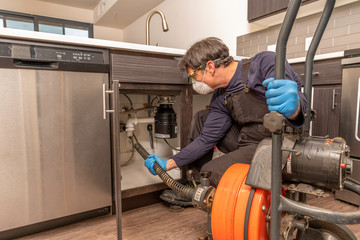Why You Need an Emergency Plumber
Plumbing is a complex network of pipes and other important components that transport water from the source to your home. A malfunction or breakage in this system can cause serious problems, from high water bills to property damage. Whenever a problem arises, contacting an emergency Plumbers Aurora CO is important. But how do you know when it’s an emergency?

Water leaks can be a major source of damage in your home. They may cause extensive structural damage, mold and mildew growth, and serious health issues. If your water pressure decreases suddenly, that could be a sign that you have a leak somewhere in the plumbing system. A burst pipe, a faulty appliance, or a leaking roof could cause this problem.
You should call an emergency plumber immediately to avoid further damage. Leaks are not only expensive, they can also make your home uninhabitable. Some water leaks go unnoticed until they do significant damage to your home. Mold and mildew form, causing respiratory problems and itchy eyes.
A quick fix for a slow leak can save you money in the long run, but you should always have your water lines checked regularly to prevent these issues from occurring. This is especially important if you have children, pets, or plants in your home.
Frozen pipes are a common problem during the winter. They can cause flooding, sewage backup and mold growth.
If you notice water coming from a faucet that is cold or not flowing fully, it could be a sign of frozen pipes. You might also notice frost on the outside of pipes that are exposed or a foul odor coming from drains.
To thaw a frozen pipe, start by turning up the heat in the house. If the pipe is behind a wall, aim a space heater at the area to gently warm it up.
When thawing a pipe, it is important to work gradually and backward from the faucet or outlet in order to avoid causing thermal shock. You should also never use a blowtorch or any other device that could ignite in the attempt to thaw it.
Frozen pipes can be dangerous and costly to repair, so don’t hesitate to call an emergency plumber if you think your pipes might be frozen. They can quickly diagnose and resolve your issue.
Burst pipes are a plumbing emergency that should be dealt with immediately by an emergency plumber. They can cause massive damage in a short space of time, leaving your home without water for days.
It’s crucial to shut off your main water supply and turn off any electrical appliances near the leak to minimize the damage. This will also save you from costly utility costs and property damage.
You can temporarily fix a burst pipe with a sleeve, which you slip over the hole to prevent water from leaking into your home. The sleeve will keep the water in your pipe for a short while, but it won’t last very long.
You should also consider upgrading the size of your piping to increase water flow and pressure. This can be done by using a method called pipe bursting which employs a special bursting head that pushes through the old pipeline to make room for the new one.
When your water is discolored, it can be a sign that there’s something wrong with your home’s plumbing system. However, it’s important to know that most of the time, this problem won’t cause you any serious health concerns.
Over time, minerals and rust can build up in the pipes of your home’s water supply. This will make the water look brown or discolored.
This is most likely caused by a disturbance in the water main that stirs up these deposits. If this is the case, the water should clear up in a few hours.
Another common reason your water may be brown is because of nearby construction work or other occurrences that disrupt the flow of the sediments within the pipes. This will also clear up in a few hours, but you might want to call a professional plumber to get a better idea of what’s going on.
You can test to see if your water is discolored by running the cold taps in different locations around your property until they all run clear. Then, you should drain and flush your hot water tank to get rid of any sediment that may be present.
